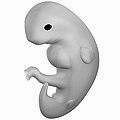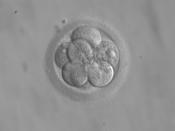The question about the moral status of the human embryo has been around for many years but still everyone cannot agree on what this status should be. Though science has shown the embryo's development as well as its utility it alone cannot help people decide the answer to this question and so many conclusions have been made.
Embryos are mainly talked about when it comes to fertility and pregnancy. In-Vitro-Fertilization and Embryo transfer have been quite common ever since the first test tube baby in 1978 was born. Here is where science enters the issue. There is nothing immoral about these two activities as they can have many benefits for the people involved such as give the opportunity of a family even to those who are infertile. However, issues start to arise when a surplus of embryos is used. The success rate of such activities is only around 25% and so in order to increase chances a procedure is used so that the woman produces many ova.
All of them are fertilized and the extra ones are kept alive and frozen just in case the first attempt doesn't work.
There are times when the extra embryos are not needed and so they remain frozen, literally forgotten by their parents. These are usually thrown away or else used for research. This is where the issue of the embryo's moral status comes in. By learning about the development of the human embryo science takes us through the making of a human being starting from a single cell to a fully developed baby. This brings us back to the question where we have to decide when the embryo becomes not just a human being but a person with the right to life.
According to the Conservative School a fertilized embryo is immediately a...



Moral status of the very early embryo
This essay takes a fascinating topic, and delivers a reasonably good accounting of the issues. The problem is perhaps best shown by the sentence: "They distinguish between the human being and the human person." The essay defines a fertilized ovum as a "human being," Does not foreclose the question of the "moral status"? If something is a "human being," how can it not have the right to survive? And if it has the right to survive, what is the question? And what is the point of this essay?
0 out of 0 people found this comment useful.